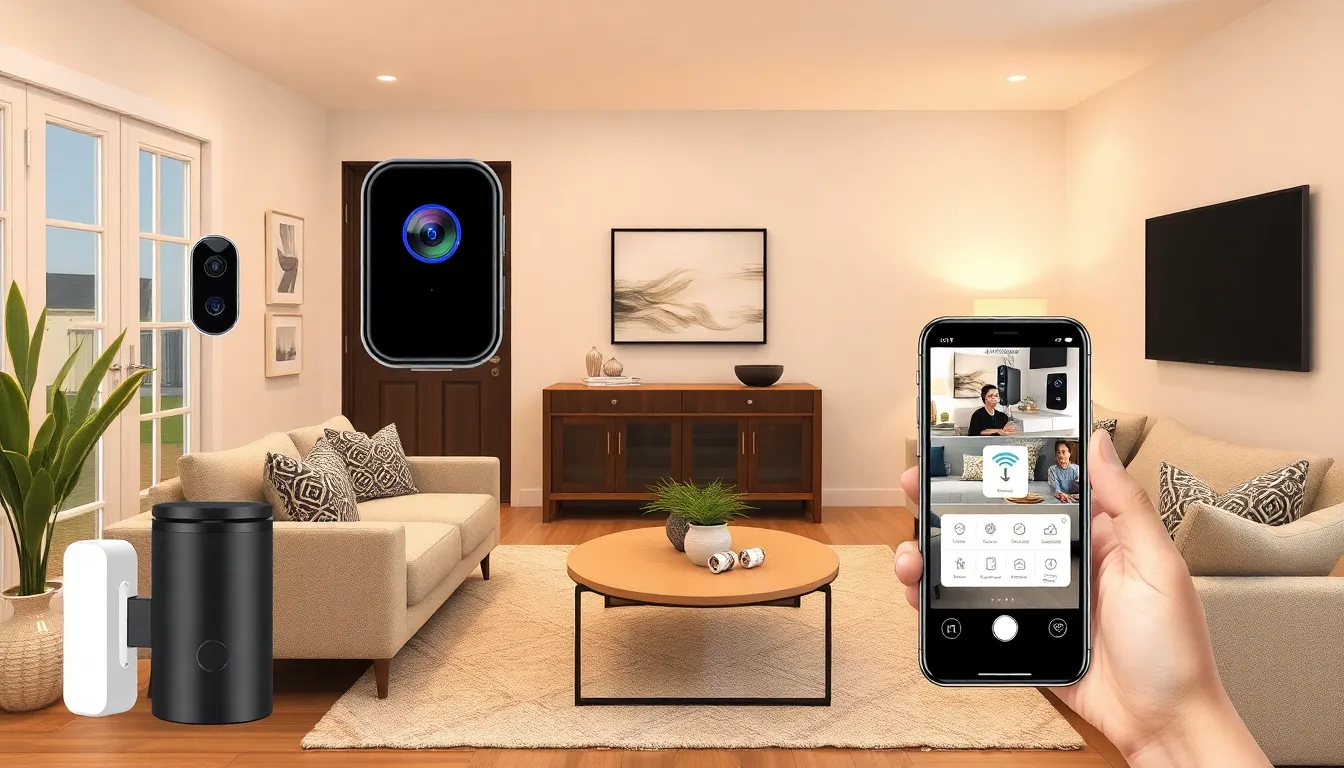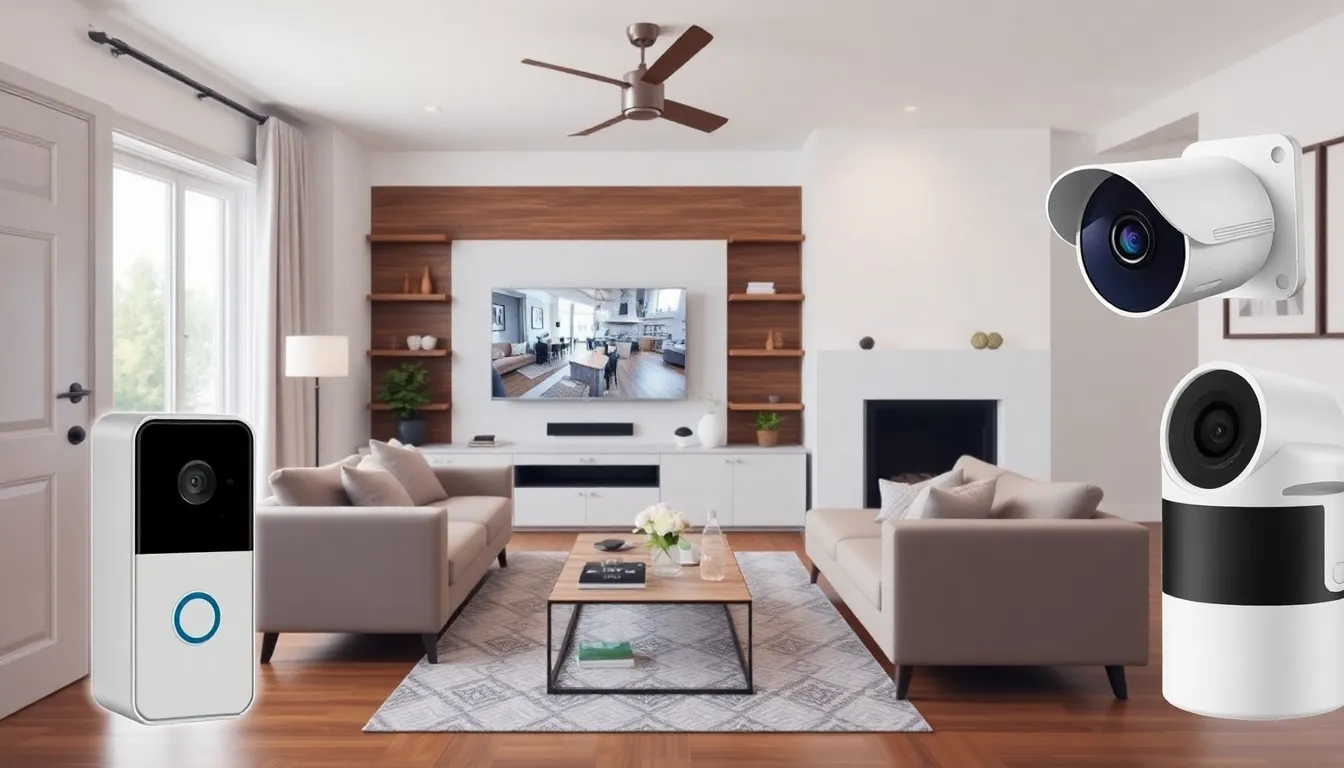Table of Contents
ToggleIn a world where the latest tech gadgets can turn a humble abode into a fortress, home security trends are evolving faster than you can say “lock your doors!” With burglars getting craftier, homeowners are stepping up their game, armed with smart devices and a sprinkle of paranoia.
From doorbell cameras that double as nosy neighbors to alarm systems that send alerts straight to your phone faster than your kids can raid the cookie jar, the landscape of home security is changing. It’s not just about keeping the bad guys out anymore; it’s about embracing technology that makes home life smoother and safer.
Overview of Home Security Trends
Home security is rapidly evolving, driven by technological advancements. Homeowners prioritize devices that increase both safety and convenience. Smart doorbell cameras serve as a prime example, allowing users to monitor their property from anywhere. Alarm systems with real-time alerts enhance responsiveness, helping safeguard homes more effectively.
Mobile apps integrate seamlessly with various security devices, offering centralized control. Users manage their security settings and receive updates, transforming how they interact with their home protection. Customizable security features cater to specific needs, enabling tailored solutions for individual households.
Integration of AI technology significantly impacts home security trends. Artificial intelligence enables smarter surveillance systems that can differentiate between familiar faces and potential intruders. Advanced analytics support trend detection, helping homeowners adapt their security measures accordingly.
In addition, the rise of DIY security systems provides flexibility and affordability. Homeowners appreciate the convenience of installing their systems without professional help. Costs associated with traditional security installations decrease as more people opt for self-installed solutions.
Another trend is the use of smart home integrations. Aligning various smart devices under one ecosystem enhances security efficiency. When a motion sensor detects activity, smart lights can automatically illuminate designated areas, deterring unwanted visitors.
Environmental considerations also shape home security trends. Increased awareness of eco-friendly practices prompts innovations in energy-efficient security systems. Sustainable technology appeals to environmentally conscious consumers.
Investing in home security systems contributes to peace of mind. As crime rates fluctuate, current homeowners recognize the value of proactive measures. Ultimately, these trends reflect a shift towards smarter, more effective home protection strategies.
Technology Advancements in Home Security


Technological advancements significantly transform home security solutions, improving safety and convenience for homeowners.
Smart Home Devices
Smart home devices play a vital role in modern security systems. Users enjoy real-time access to surveillance through doorbell cameras and indoor cameras. Motion detectors alert homeowners of unusual activity, enhancing responsiveness. Centralized mobile apps enable easy control over security features, allowing adjustments from anywhere. Many systems offer compatibility with existing home automation tools, improving overall efficiency. Recent innovations focus on user-friendly setups, making installation simple and accessible for everyone.
AI and Machine Learning in Security Systems
AI and machine learning further enhance home security. These technologies analyze patterns in surveillance footage, identifying familiar faces and distinguishing them from strangers. Systems equipped with artificial intelligence send alerts when suspicious activity occurs. Predictive algorithms enable proactive measures, improving threat detection and response times. Machine learning continually adapts to user behavior, optimizing security settings based on specific household patterns. Such advancements reflect the industry’s commitment to leveraging technology for smarter, more effective protection strategies.
Key Industry Trends to Watch
Technological trends in home security continue to reshape protection strategies. Homeowners increasingly adopt innovative approaches to safeguard their properties.
Increased Use of Wireless Security Systems
Wireless security systems gain popularity due to their ease of installation and flexibility. Users appreciate the absence of cables, facilitating placement in various locations. Devices connect seamlessly to Wi-Fi networks, offering remote monitoring capabilities. For instance, cameras and sensors transmit real-time alerts directly to smartphones. Cost-effectiveness also plays a role, as many prefer DIY installation options. Over the past year, sales of wireless systems have surged by over 30%, reflecting growing demand.
Integration of Home Automation and Security
Home automation’s influence on security systems is on the rise, creating a unified home management approach. Security devices now network with smart home platforms, enabling centralized control. Homeowners enjoy features like automated lighting, which enhances security while providing convenience. Surveillance systems link with smart assistants, offering voice-controlled monitoring options. Recent studies found that 40% of consumers invest in integrated systems for their enhanced functionality. This trend underlines the necessity for efficiency and intuitiveness in home security solutions.
Challenges in Home Security
Homeowners face several challenges in maintaining effective home security. Two significant concerns include privacy and cybersecurity risks.
Privacy Concerns
Privacy issues arise from increased surveillance capabilities. Cameras and smart devices can inadvertently record sensitive moments. Individuals often feel uneasy about constant monitoring, especially with data being stored in cloud systems. Transparency regarding how data is used can help address these concerns. Moreover, maintaining control over personal information reinforces trust in security solutions. Balancing surveillance with privacy rights remains an essential aspect of modern home security.
Cybersecurity Risks
Cybersecurity threats pose significant challenges to smart home security systems. Hackers increasingly target connected devices to gain unauthorized access. Intrusions can compromise personal data or even disable security measures. Regular updates and strong passwords help mitigate these risks but may not always guarantee complete protection. Collaboration with cybersecurity experts ensures that homeowners employ the latest security practices. Understanding the importance of robust cybersecurity strategies is vital for any homeowner investing in smart technology.
Future Predictions for Home Security
Emerging technologies will shape the future of home security, emphasizing user experience and adaptability. A notable trend involves increased integration of AI, making security systems more intelligent. Predictions suggest that AI-powered devices will not only analyze patterns in real-time but also predict possible security threats before they occur.
Smart home ecosystems are expected to become commonplace. Compatibility among various devices will streamline control through a single mobile application. Homeowners will appreciate the ability to manage everything from lighting to security cameras effortlessly, enhancing convenience.
Wireless security systems will continue to dominate the market. Their ease of installation and flexibility make them attractive options for many. Experts forecast a rise in DIY security solutions, granting homeowners greater autonomy and control over their security setups.
Cybersecurity concerns will drive innovations focused on protecting personal data. Developers will enhance encryption methods to safeguard connected devices against unauthorized access. As hackers become more sophisticated, robust security measures must be at the forefront of product design.
Sustainability will influence home security trends as well. Consumers increasingly seek energy-efficient systems that fit into eco-friendly lifestyles. Brands that prioritize sustainability may gain a competitive edge, appealing to environmentally conscious homeowners.
Privacy concerns will persist alongside advancements in technology. Transparency in how data is collected and used will be paramount for building consumer trust. Companies that prioritize user control over personal information will likely foster stronger relationships with their customers.
Overall, the future of home security appears bright. Continuous innovation, an emphasis on convenience and security, along with a commitment to privacy, will guide the industry.
The landscape of home security is rapidly changing. Homeowners are embracing innovative technologies that not only enhance safety but also simplify everyday living. With the rise of smart devices and AI integration, security systems are becoming more intuitive and efficient.
As trends continue to evolve, prioritizing privacy and cybersecurity will be crucial. Homeowners must remain vigilant in protecting their personal data while enjoying the benefits of advanced security solutions. The future promises even greater advancements, making it essential for homeowners to stay informed and proactive in their security choices. Embracing these trends will lead to a safer and more secure home environment.






